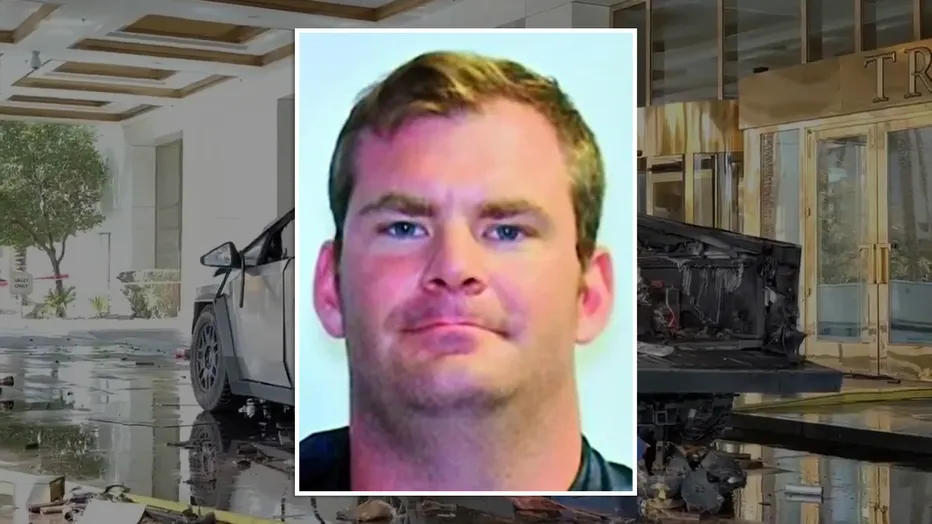In a chilling incident that has shocked the nation, a Tesla Cybertruck exploded outside the Trump International Hotel in Las Vegas on New Year’s Day, killing the driver and injuring seven bystanders. The driver, identified as 37-year-old Army Green Beret Matthew Livelsberger, used generative AI tools, including ChatGPT, to research and plan the attack, according to investigators.
Details of the Incident
The explosion occurred in the early morning hours, sending debris and flames across the area. Witnesses reported hearing a loud blast followed by shattering glass and screams as chaos erupted near the luxury hotel. The Cybertruck, equipped with fireworks, gas tanks, and camping fuel, had been rigged with an improvised detonation system controlled by Livelsberger, who was found deceased inside the vehicle from a self-inflicted gunshot wound.
Authorities believe Livelsberger planned the attack meticulously, using advanced AI tools to gather information. A review of his search history revealed inquiries about explosive targets, ammunition speeds, and the legality of fireworks in Arizona, all conducted through AI-powered platforms like ChatGPT. Investigators noted that these searches played a critical role in the preparation of the attack.
Driver’s Background and Motive
Matthew Livelsberger was an experienced Army Green Beret who had served two deployments in Afghanistan. At the time of the incident, he was on leave from his station in Germany. In notes recovered from his belongings, Livelsberger described his actions as a “wake-up call” for the nation and revealed struggles with post-traumatic stress disorder (PTSD) stemming from his wartime experiences. He expressed a desire to “cleanse” his mind from these traumas, which he claimed drove him to take such drastic measures.
While no direct connections to extremist groups have been identified, authorities are investigating Livelsberger’s motives and whether he acted alone or was influenced by external factors.
The Role of Generative AI in the Attack
The use of generative AI in the planning of the attack has raised alarm among law enforcement and technology experts. AI tools, such as ChatGPT, are designed to assist users with information and problem-solving but have also shown potential for misuse when accessed by individuals with malicious intent. Livelsberger’s use of AI to obtain technical information about explosives underscores the growing concern about the accessibility and ethical implications of such technologies.
“These tools are incredibly powerful, and while they offer tremendous benefits, they also pose significant risks when used improperly,” said Dr. Emily Carter, a technology ethics expert. “This incident highlights the urgent need for safeguards and ethical guidelines to prevent the misuse of AI.”
Impact on Public Safety and Technology Policy
The explosion has sparked a broader discussion about the intersection of mental health, technology, and public safety. As AI continues to evolve, policymakers are grappling with how to regulate these tools while balancing innovation and security. Law enforcement agencies are also considering new measures to monitor and restrict the use of AI for criminal purposes.
“Technology is a double-edged sword,” said Las Vegas Police Chief James Turner. “We need to find ways to mitigate its potential for harm while preserving its benefits for society.”
The incident also raises questions about the mental health support provided to veterans. Advocates have pointed to Livelsberger’s struggles with PTSD as a call to action for better mental health resources and counseling for those returning from combat.
Community Response
The Las Vegas community has been left reeling from the explosion. Nearby businesses and residents expressed shock and grief over the incident, and vigils have been held to honor the victims. Seven individuals who were injured in the blast are currently receiving treatment for their injuries, with two in critical condition.
In a statement, Trump International Hotel management expressed their condolences to the victims and pledged to cooperate fully with the ongoing investigation. The hotel remains closed while authorities assess the damage and clear the site.
Ongoing Investigation
The FBI and local law enforcement are treating the incident as a potential act of terrorism. While no links to known terror organizations have been established, officials are carefully examining Livelsberger’s background and online activities. Investigators are also exploring whether similar incidents could occur if AI tools remain unregulated.
A Wake-Up Call for AI Regulation
The explosion has sparked renewed calls for regulation of AI technologies. Lawmakers and tech leaders are debating how to strike a balance between innovation and security. Proposals include implementing usage restrictions, improving content moderation, and creating an oversight framework to address the ethical challenges posed by AI.
“This tragedy serves as a stark reminder of the unintended consequences of technological progress,” said Senator Linda Martinez, a leading advocate for AI regulation. “We must act swiftly to ensure these tools are used responsibly.”
Looking Forward
As the investigation continues, the focus remains on understanding the full scope of Livelsberger’s actions and addressing the vulnerabilities exposed by the incident. For now, the explosion at the Trump International Hotel serves as a grim reminder of the complexities and challenges that accompany the rapid advancement of technology in a modern world fraught with mental health and security issues.

